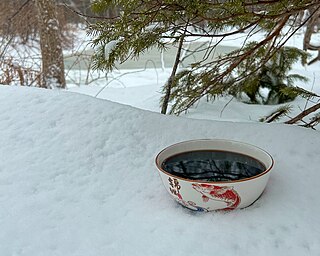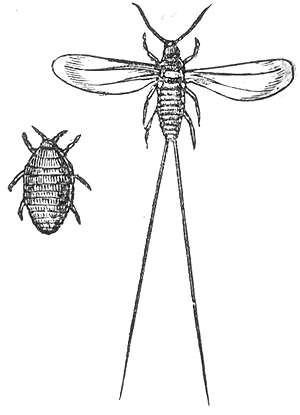
A bean is the seed of any plant in the legume family (Fabaceae) used as a vegetable for human consumption or animal feed. The seeds are often preserved through drying, but fresh beans are also sold. Most beans are traditionally soaked and boiled, but they can be cooked in many different ways, including frying and baking, and are used in many traditional dishes throughout the world. The unripe seedpods of some varieties are also eaten whole as green beans or edamame, but fully ripened beans contain toxins like phytohemagglutinin and require cooking.
Flatulence is the expulsion of gas from the intestines via the anus, commonly referred to as farting. "Flatus" is the medical word for gas generated in the stomach or bowels. A proportion of intestinal gas may be swallowed environmental air, and hence flatus is not entirely generated in the stomach or bowels. The scientific study of this area of medicine is termed flatology.

Anise, also called aniseed or rarely anix, is a flowering plant in the family Apiaceae native to the eastern Mediterranean region and Southwest Asia.

Fart lighting, also known as pyroflatulence or flatus ignition, is the practice of igniting the gases produced by flatulence. The resulting flame is often of a blue hue hence the act being known colloquially as a "blue angel", "blue dart" or in Australia, a "blue flame". The fact that flatus is flammable and the actual combustion of it through this practice gives rise to much humorous derivation. Other colors of flame such as orange and yellow are possible depending on the mixture of gases formed in the colon.

An essential oil is a concentrated hydrophobic liquid containing volatile chemical compounds from plants. Essential oils are also known as volatile oils, ethereal oils, aetheroleum, or simply as the oil of the plant from which they were extracted, such as oil of clove. An essential oil is essential in the sense that it contains the essence of the plant's fragrance—the characteristic fragrance of the plant from which it is derived. The term "essential" used here does not mean required or usable by the human body, as with the terms essential amino acid or essential fatty acid, which are so called because they are nutritionally required by a living organism.

Panniculitis is a group of diseases whose hallmark is inflammation of subcutaneous adipose tissue. Symptoms include tender skin nodules, and systemic signs such as weight loss and fatigue.

Monarda is a genus of flowering plants in the mint family, Lamiaceae. The genus is endemic to North America. Common names include bergamot, bee balm, horsemint, and oswego tea, the first being inspired by the fragrance of the leaves, which is reminiscent of bergamot orange. The genus was named for the Spanish botanist Nicolás Monardes, who wrote a book in 1574 describing plants of the New World.
Abdominal bloating is a short-term disease that affects the gastrointestinal tract. Bloating is generally characterized by an excess buildup of gas, air or fluids in the stomach. A person may have feelings of tightness, pressure or fullness in the stomach; it may or may not be accompanied by a visibly distended abdomen. Bloating can affect anyone of any age range and is usually self-diagnosed, in most cases does not require serious medical attention or treatment. Although this term is usually used interchangeably with abdominal distension, these symptoms probably have different pathophysiological processes, which are not fully understood.

Withania somnifera, known commonly as ashwagandha, is an evergreen shrub in the Solanaceae or nightshade family that grows in Nepal, India, the Middle East, and parts of Africa. Several other species in the genus Withania are morphologically similar.
An antiflatulent agent is a drug used for the alleviation or prevention of excessive intestinal gas, i.e., flatulence.

Abdominal distension occurs when substances, such as air (gas) or fluid, accumulate in the abdomen causing its expansion. It is typically a symptom of an underlying disease or dysfunction in the body, rather than an illness in its own right. People with this condition often describe it as "feeling bloated". Affected people often experience a sensation of fullness, abdominal pressure, and sometimes nausea, pain, or cramping. In the most extreme cases, upward pressure on the diaphragm and lungs can also cause shortness of breath. Through a variety of causes, bloating is most commonly due to buildup of gas in the stomach, small intestine, or colon. The pressure sensation is often relieved, or at least lessened, by belching or flatulence. Medications that settle gas in the stomach and intestines are also commonly used to treat the discomfort and lessen the abdominal distension.
An oil is any nonpolar chemical substance that is composed primarily of hydrocarbons and is hydrophobic and lipophilic. Oils are usually flammable and surface active. Most oils are unsaturated lipids that are liquid at room temperature.
A silicone oil is any liquid polymerized siloxane with organic side chains. The most important member is polydimethylsiloxane. These polymers are of commercial interest because of their relatively high thermal stability and their lubricating properties.

Decoction is a method of extraction by boiling herbal or plant material to dissolve the chemicals of the material. It is the most common preparation method in various herbal medicine systems. Decoction involves first drying the plant material; then mashing, slicing, or cutting the material to allow for maximum dissolution; and finally boiling in water to extract oils, volatile organic compounds and other various chemical substances. Occasionally, aqueous ethanol or glycerol may be used instead of water. Decoction can be used to make tisanes, tinctures and similar solutions. Decoctions and infusions may produce liquids with differing chemical properties, as the temperature or preparation difference may result in more oil-soluble chemicals in decoctions versus infusions. The process can also be applied to meats and vegetables to prepare bouillon or stock, though the term is typically only used to describe boiled plant extracts, usually for medicinal or scientific purposes.

Agasyllis is a monotypic genus of flowering plants belonging to the celery family Apiaceae. The single species, A. latifolia. is endemic to the Caucasus, where it is valued both as a food and a folk medicine.

Monarda fistulosa, the wild bergamot or bee balm, is a wildflower in the mint family Lamiaceae, widespread and abundant as a native plant in much of North America. This plant, with showy summer-blooming pink to lavender flowers, is often used as a honey plant, medicinal plant, and garden ornamental. The species is quite variable, and several subspecies or varieties have been recognized within it. Despite its name, it has no relation to the 'true' bergamot, a citrus fruit.

The cochineal is a scale insect in the suborder Sternorrhyncha, from which the natural dye carmine is derived. A primarily sessile parasite native to tropical and subtropical South America through North America, this insect lives on cacti in the genus Opuntia, feeding on plant moisture and nutrients. The insects are found on the pads of prickly pear cacti, collected by brushing them off the plants, and dried.
Vaginal flatulence or vaginal wind is an emission or expulsion of air from the vagina. It may occur during or after sexual intercourse, or during other sexual acts, stretching or exercise. The sound is comparable to anal flatulence, but vaginal flatulence does not involve waste gases, and thus does not have a specific odor associated with it. Slang terms for vaginal flatulence include queef, vart, and fanny fart. Tampons can treat or prevent vaginal wind.

Mule spinners' cancer or mule-spinners' cancer was a cancer, an epithelioma of the scrotum. It was first reported in 1887 in a cotton mule spinner. In 1926, a British Home Office committee strongly favoured the view that this form of cancer was caused by the prolonged action of mineral oils on the skin of the scrotum, and of these oils, shale oil was deemed to be the most carcinogenic. From 1911 to 1938, there were 500 deaths amongst cotton mule-spinners from cancer of the scrotum, but only three amongst wool mule spinners.
Alpinia nigra is a medium-sized herb belonging to the ginger family. The rhizome is well known in many Asian cultures as a medicinal and culinary item. In many Asian tribal communities it is a part of the diet along with rice.












